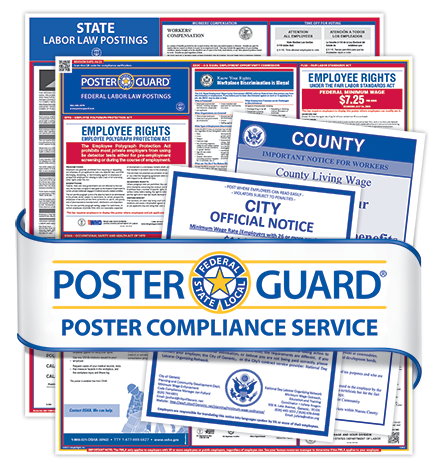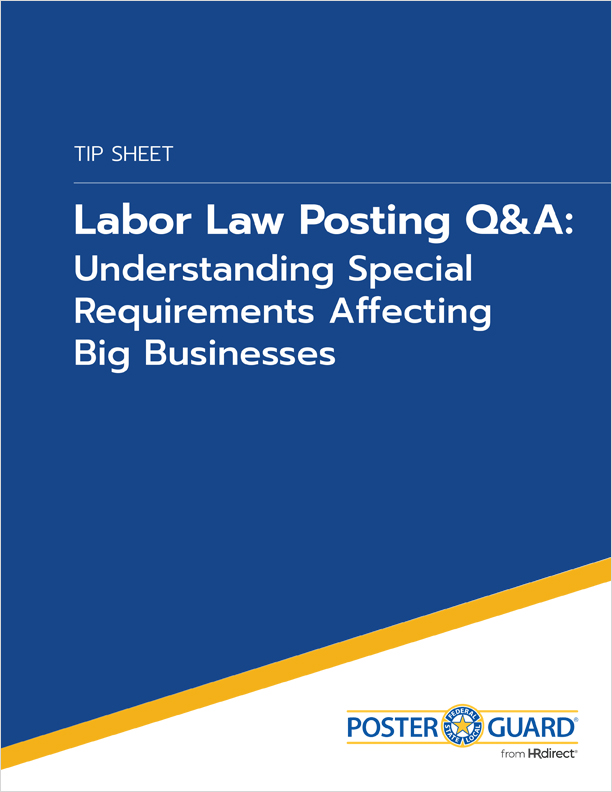Offering job-protected time off and upping the minimum wage rate are two ways lawmakers across the country are bypassing the inertia of federal government. It’s a national trend that’s gaining momentum as the state, county, and municipal governments from California to Chicago create progressive new laws that offer employees more generous protections than existing federal laws. Currently, the federal government doesn’t establish paid-sick-time requirements for the private sector, and the federal minimum wage was last raised in 2009.
The changes have a direct effect on labor law posting requirements, which are more complicated than ever.
More Localities Offer Paid Leave Laws in 2017
Being able to take paid time off from work when you become ill is an important benefit, but it’s not something the federal government requires from private businesses. The result? Some cities and counties have drawn up laws to address the issue and provide better employee benefits.
When it comes to sick leave, numerous cities and/or counties from Illinois to California approved changes for 2016 and 2017 to provide job-protected time off and paid time off. (Before 2016, only a few other cities required paid sick leave.)
The numbers are increasing as local governments continue to take matters into their own hands. Here’s a list of some cities and counties that have recently enacted paid sick leave benefits:
- Spokane, WA
- Minneapolis, MN
- St. Paul, MN
- Chicago, IL
- Cook County, IL
- Montgomery County, MD
- Berkeley, CA
- Santa Monica, CA
- San Diego, CA
- Los Angeles, CA
- Morristown, NJ
- Plainfield, NJ
Let’s take a closer look at some of the sick-leave policies
the different localities have approved:
- The Spokane Earned Sick and Safe Leave law, effective Jan. 1, 2017, requires employers to provide mandatory employee paid sick and safe leave to care
for a sick family member, to seek treatment or safety from domestic violence,
or for bereavement. - The Berkeley, CA Paid Sick Leave ordinance, effective Oct. 1, 2017, provides employees with 1 hour of paid sick leave for every 30 hours worked, up to a maximum of 72 hours for employers with 26 or more employees, and a maximum
of 48 hours for employers with 25 or fewer employees. - The Santa Monica Paid Sick Leave ordinance, effective Jan. 1, 2017, provides employees with 1 hour of paid sick leave for every 30 hours worked, up to a maximum of 72 hours for employers with 26 or more employees, and a maximum
of 40 hours for employers with 25 or fewer employees. - The Los Angeles Paid Sick Leave law, effective July 1, 2016, allows employees
to accrue and use up to 48 hours of sick leave. - The San Diego Earned Sick Leave law, effective July 11, 2016, requires all employers to provide paid earned sick leave to employees, including temporary
and part-time employees, who perform at least two hours of work within the geographical boundaries of the city of San Diego. - The Montgomery County Earned Sick and Safe Leave law, effective Oct. 1, 2016, requires employers in Montgomery County to provide most employees
with up to 56 hours of paid sick and safe leave. - The Plainfield Paid Sick Time law, effective July 14, 2016, allows employees to earn one hour of paid sick time for every 30 hours worked.
- The Morristown Paid Sick Time law, effective Jan. 11, 2017, provides employees with up to 40 hours of paid sick leave annually
Localities Raise Minimum Wage Rates
when Federal Government Doesn’t Act
Local governments have also exercised home rule to boost the minimum wage rate.
Nearly 50 cities and counties across the nation adjusted their minimum wage rates upwards effective in 2017 to offer employees more competitive hourly wages.
The federal rate has remained stagnant at $7.25 an hour since 2009.
For example, workers in Berkeley, CA will earn a minimum hourly pay rate of $13.75
as of October 1, 2017; workers in SeaTac, WA began earning a minimum hourly wage of $15.34, effective January 1, 2017; and workers in Portland, OR will earn an hourly minimum wage of $11.25 as of July 1, 2017.
In the face of strong resistance to a federal-level wage hike, advocates are quick
to point out the success of cities such as San Francisco that act independently
on the issue. More than a decade ago, the city made history for raising the minimum wage above the federal standard. Since then, San Francisco has reported steady employment growth that surpasses all its surrounding counties. Not only did a
wage hike not discourage employers from hiring, but it also helped companies save money due to greater employee loyalty and less turnover.
With San Francisco serving as a positive role model for change, we can expect more cities to follow its lead and explore the economic and employment advantages of a higher minimum wage. To read more about the minimum wage laws across the U.S., click here.
Lock in Total Posting Compliance for the New Year
Posting compliance is more complicated than ever! In a single year, it’s not unusual for HRdirect’s Poster Guard legal team to identify and track hundreds of state and local posting changes (including minimum wage increases). Be aware that changes can be complex and require vigilance when it comes to posting requirements. To remain compliant, you must display state, local and federal postings, even if they conflict. You’re required to honor the most generous benefits and the highest hourly rate
of pay.
Why not put the power of an experienced legal team behind you? With the dedicated service of Poster Guard® Compliance Protection, you’re guaranteed 365 days of hassle-free labor law posting compliance. You’ll receive an up-to-date federal, state and local poster set, along with automatic poster replacements every time a mandatory change occurs. Best of all, you’re guaranteed 100% compliance.
We do the heavy lifting, so you don’t have to.



